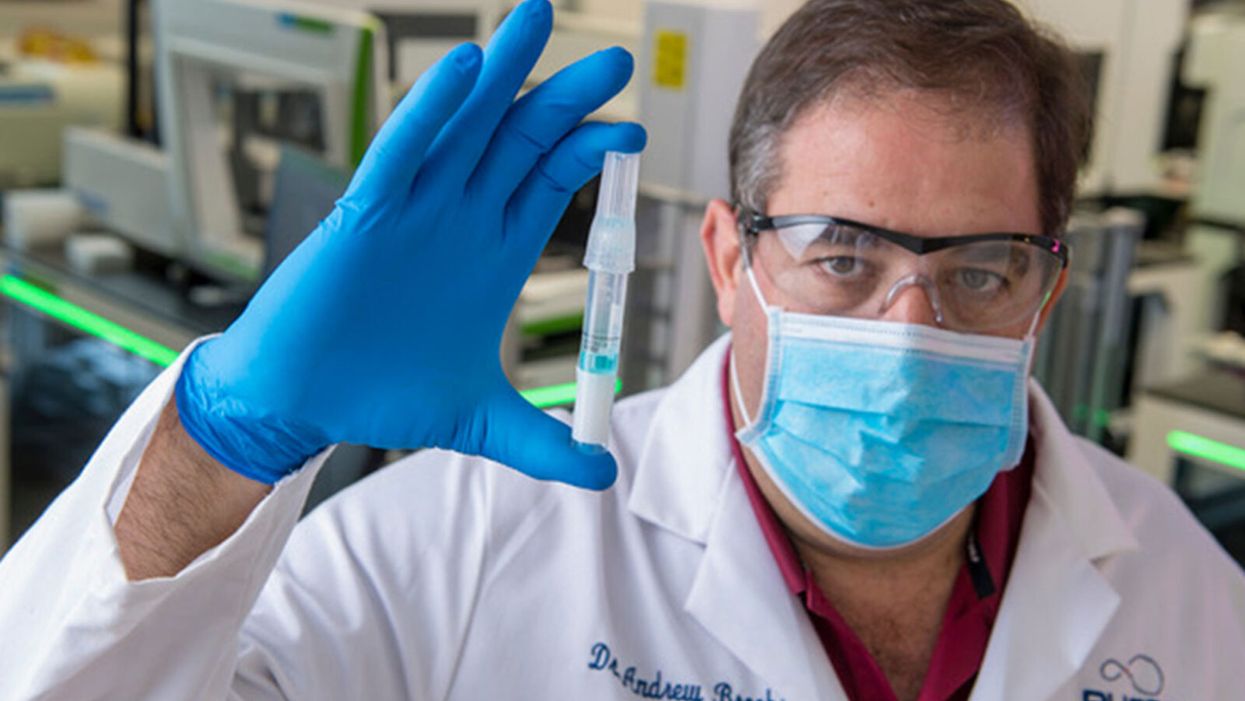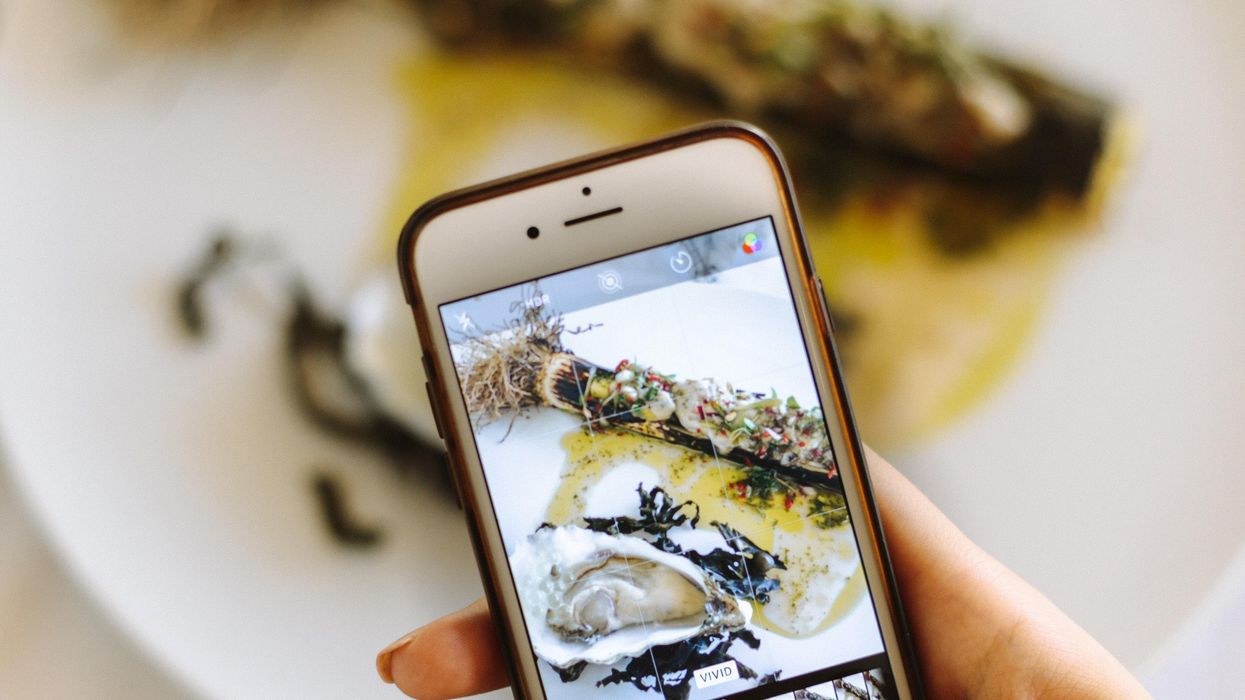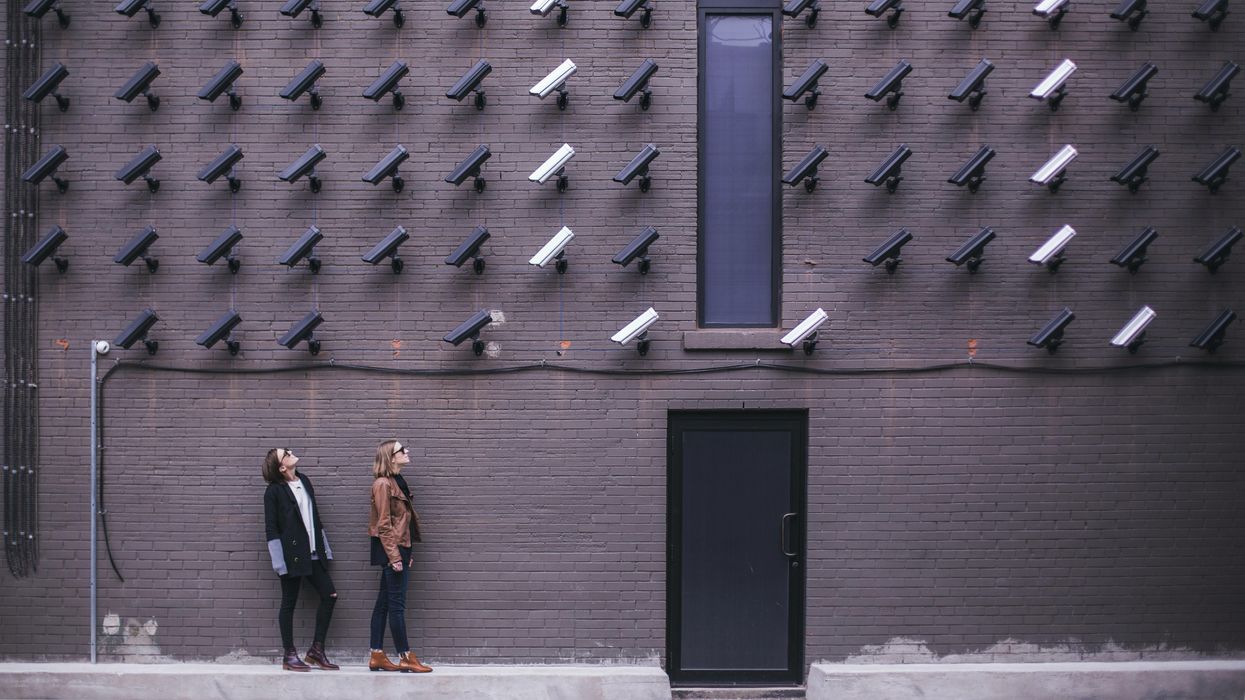Saliva Testing Offers Easier and Earlier Detection of COVID-19

Dr. Andrew Brooks of RUCDR Infinite Biologics holds up a saliva sample.
The patient tilts back her head and winces as the long swab stick pushes six inches up her nose. The tip twirls around uncomfortably before it's withdrawn.
"Our saliva test can detect the virus in asymptomatic and pre-symptomatic cases."
A gloved and gowned healthcare worker wearing a face shield and mask tells the patient that she will learn whether she is positive for COVID-19 as soon as the lab can process her test.
This is the typical unpleasant scenario for getting a coronavirus test. But times are rapidly changing: Today, for the first time, the U.S. Food and Drug Administration cleared one company to sell saliva collection kits for individuals to use at home.
Scientists at the startup venture, RUCDR Infinite Biologics at Rutgers University in New Jersey, say that saliva testing offers an easier, more useful alternative to the standard nasal swab.
"Our saliva test can detect the virus in asymptomatic and pre-symptomatic cases," said Dr. Andrew Brooks, chief operating officer at RUCDR.
Another venture, Darwin BioSciences in Colorado, has separately developed an innovative method of testing saliva for the coronavirus that causes COVID-19.
Saliva testing can allow earlier detection to identify people who may not know they are contagious, say scientists at both companies. In addition, because patients spit into a tube or cup, saliva testing is safer for healthcare workers than taking swabs. This frees up scarce personal protective equipment (PPE) for use elsewhere. Nasal swabs themselves have been in scarce supply.
Saliva testing, if it becomes widespread, potentially could mean opening society sooner. The more ubiquitous testing becomes across the population, experts say, the more feasible it becomes for public health officials to trace and isolate contacts, especially of asymptomatic cases. Testing early and often will be essential to containing emerging hot spots before a vast outbreak can take root.
Darwin Biosceiences is preparing to seek an FDA Emergency Use Authorization (EUA) this month for its patented "CoVScreen" testing system, which potentially could be available to labs nationally by mid-summer.
Meanwhile, Infinite Biologics will now begin selling kits to consumers for home collection, upon order by a physician. The FDA said that the company's saliva test was as accurate as the nasal swab method used by health care professionals. An FDA summary documenting the company's data reported: "There was 100% positive and negative agreement between the results obtained from testing of saliva and those obtained from nasopharyngeal and oropharyngeal swabs."
The greatest scientific advantage, said Dr. Brooks, is that nasal and oral swabs only collect the surface area where the swab goes, which may not be the place with most viral load. In contrast, the virus occurs throughout a saliva sample, so the test is more trustworthy.
The lab at Rutgers can process 20,000 tests a day, with a 48-hour turnaround. They have 75,000 tests ready to ship now.
The Leap: Detecting Sickness Before You Feel It
"We wanted to create a device that could detect infections before symptoms appeared," explained Nicholas Meyerson, co-founder and CEO of Darwin.
For more than 300 years, he said, "the thermometer was the gold standard for detecting disease because we thought the first sign of illness was a fever. This COVID-19 pandemic has proven that not all pathogens cause a fever. You can be highly contagious without knowing it."
"The question is whether we can scale up fast enough to meet the need. I believe saliva testing can help."
Therefore, Meyerson and co-founder Sara Sawyer from the University of Colorado began to identify RNA biomarkers that can sense when a pathogen first enters a molecule and "sets off alarms." They focused on the nucleic acids concentrated in saliva as the best and easiest place to collect samples for testing.
"The isothermal reaction in saliva takes place at body or room temperature," he said, "so there's no need for complicated testing machinery. The chemical reaction can be read out on a paper strip, like a pregnancy test -- two stripes if you're sick, and one stripe if you're okay."
Before the pandemic, limited but successful human trials were already underway at CU in Boulder and at the CU Anschutz Medical Campus east of Denver. "This was our proof of concept," he said.
Darwin was founded in March and has secured enough venture capital to concentrate protype development on detecting the virus causing COVID-19. So far, said Meyerson, "Everything works."
A small double-blind test of 30 samples at CU produced 100 percent accuracy. "I'm not sure if that will hold true as we go into clinical trials," he said, "but I'm confident we will satisfy all the requirements for at least 95 percent clinical validation."
The specific "CoVStick" test strips will roll out soon, he said: "We hope before the second wave of the pandemic hits."
The broader saliva test-strip product from Darwin, "SickStick," is still one to two years away from deployment by the military and introduction into the consumer drugstore market for home use, said Meyerson. It will affordably and quickly detect a range of viral and bacterial infections.

An illustration of the "CoVStick."
(Darwin Biosciences)
A Potential Game Changer
Society needs widespread testing daily, said George Church, founding core faculty of the Wyss Institute for Biologically Inspired Engineering at Harvard University. Speaking at an online SynBioBeta webinar in April, he urged developing stockpiles of testing kits for home use.
As for any potential of false positives, Church said a much bigger risk is not having enough tests.
"Saliva testing is going to speed up the timeline for opening society a lot," said Meyerson. "People need to self-collect samples at home. A lot more people are going to be willing to spit into a tube than to push a swab six inches up their own nose."
Brooks, of Rutgers, addressed the big picture. "It's critical that we open society as soon as possible to minimize the economic impact of the pandemic. Testing is the surest and safest path. The question is whether we can scale up fast enough to meet the need. I believe saliva testing can help."
Podcast: The Friday Five weekly roundup in health research
Scientists have designed a phone app that could alert consumers to high levels of cancer-causing chemicals, Yale researchers revive organs in dead pigs, and more in this week's Friday Five.
The Friday Five covers five stories in health research that you may have missed this week. There are plenty of controversies and troubling ethical issues in science – and we get into many of them in our online magazine – but this news roundup focuses on scientific creativity and progress to give you a therapeutic dose of inspiration headed into the weekend.
Listen to the Episode
Listen on Apple | Listen on Spotify | Listen on Stitcher | Listen on Amazon | Listen on Google
Covered in this week's Friday Five:
- A new blood test for cancer
- Patches of bacteria can use your sweat to power electronic devices
- Researchers revive organs of dead pigs
- Phone apps detects cancer-causing chemicals in foods
- Stem cells generate "synthetic placentas" in mice
Plus, an honorable mention for early research involving vitamin K and Alzheimer's
The limits of digital privacy are becoming clearer in the post-Dobbs era, as a wide range of data sources can reveal online and offline activities, including whether a woman seeks an abortion.
Since the recent reversal of Roe v. Wade — the landmark decision establishing a constitutional right to abortion — the vulnerabilities of reproductive health data and various other information stored on digital devices or shared through the Web have risen to the forefront.
Menstrual period tracking apps are an example of how technologies that collect information from users could be weaponized against abortions seekers. The apps, which help tens of millions of users in the U.S. predict when they’re ovulating, may provide evidence that leads to criminal prosecution in states with abortion bans, says Anton T. Dahbura, executive director of the Johns Hopkins University Information Security Institute. In states where abortion is outlawed, “it’s probably best to not use a period tracker,” he says.
Following the Dobbs v. Jackson ruling in late June that overturned Roe, even women who suffered a miscarriage could be suspected of having an abortion in some cases. While using these apps in anonymous mode may appear more secure, “data is notoriously difficult to perfectly anonymize,” Dahbura says. “Whether the data are stored on the user’s device or in the cloud, there are ways to connect that data to the user.”
Completely concealing one’s tracks in cyberspace poses enormous challenges. Digital forensics can take advantage of technology such as GPS apps, security cameras, license plate trackers, credit card transactions and bank records to reconstruct a person’s activities,” Dahbura says. “Abortion service providers are also in a world of risk for similar reasons.”
Practicing “good cyber hygiene” is essential. That’s particularly true in states where private citizens may be rewarded for reporting on women they suspect of having an abortion, such as Texas, which passed a so-called bounty hunter law last fall. To help guard against hacking, Dahbura suggests using strong passwords and two-factor authentication when possible while remaining on alert for phishing scams on email or texts.
Another option for safeguarding privacy is to avoid such apps entirely, but that choice will depend on an individual’s analysis of the risks and benefits, says Leah Fowler, research assistant professor at the University of Houston Law Center, Health Law & Policy Institute.
“These apps are popular because people find them helpful and convenient, so I hesitate to tell anyone to get rid of something they like without more concrete evidence of its nefarious uses,” she says. “I also hate the idea that asking anyone capable of becoming pregnant to opt out of all or part of the digital economy could ever be a viable solution. That’s an enormous policy failure. We have to do better than that.”
The potential universe of abortion-relevant data can include information from a variety of fitness and other biometric trackers, text and social media chat records, call details, purchase histories and medical insurance records.
Instead, Fowler recommends that concerned consumers read the terms of service and privacy policies of the apps they’re using. If some of the terms are unclear, she suggests emailing customer service with questions until the answers are satisfactory. It’s also wise for consumers to research products that meet their specific needs and find out whether other women have raised concerns about specific apps. Users interested in more privacy may want to switch to an app that stores data locally, meaning the data stays on your device, or does not use third-party tracking, so the app-maker is the only company with access to it, she says.
Period tracking apps can be useful for those on fertility journeys, making it easier to store information digitally than on paper charts. But users may want to factor in whether they live in a state with an anti-abortion stance and run the risk of legal issues due to a potential data breach, says Carmel Shachar, executive director of the Petrie-Flom Center for Health Law Policy, Biotechnology, and Bioethics at Harvard Law School.
Consumers’ risks extend beyond period tracking apps in the post-Roe v. Wade era. “Anything that creates digital breadcrumbs to your reproductive choices and conduct could raise concerns — for example, googling ‘abortion providers near me’ or texting your best friend that you are pregnant but do not want to be,” Shachar says. Women also could incriminate themselves by bringing their phones, which may record geolocation data, to the clinic with them.
The potential universe of abortion-relevant data can include information from a variety of fitness and other biometric trackers, text and social media chat records, call details, purchase histories and medical insurance records, says Rebecca Wexler, faculty co-director of the Berkeley Center for Law & Technology. “These data sources can reveal a pregnant person’s decision to seek or obtain an abortion, as well as reveal a healthcare provider’s provision of abortion services and anyone else’s provision of abortion assistance,” she says.
In some situations, people or companies could inadvertently expose themselves to risk after posting on social media with offers of places for abortion seekers to stay after traveling from states with bans. They could be liable for aiding and abetting abortion. At this point, it’s unclear whether states that ban abortion will try to prosecute residents who seek abortions in other states without bans.
Another possibility is that a woman seeking an abortion will be prosecuted based not only on her phone’s data, but also on the data that law enforcement finds on someone else’s device or a shared computer. As a result, “people in one household may find themselves at odds with each other,” says K Royal, faculty fellow at the Center for Law, Science, and Innovation at Arizona State University’s Sandra Day O'Connor College of Law. “This is a very delicate situation.”
Individuals and corporate executives should research their options before leaving a digital footprint. “Guard your privacy carefully, whether you are seeking help or you are seeking to help someone,” Royal says. While she has come across recommendations from other experts who suggest carrying a second phone that is harder to link a person’s identity for certain online activities, “it’s not practical on a general basis.”
The privacy of this health data isn’t fully protected by the law because period trackers, texting services and other apps are not healthcare providers — and as a result, there’s no prohibition on sharing the information with a third party under the Health Insurance Portability and Accountability Act of 1996, says Florencia Marotta-Wurgler, a professor who specializes in online consumer contracts and data privacy at the NYU School of Law.
“So, as long as there is valid consent, then it’s fair game unless you say that it violates the reasonable expectations of consumers,” she says. “But this is pretty unchartered territory at the moment.”
As states implement laws granting anyone the power to report suspected or known pregnancies to law enforcement, anti-choice activists are purchasing reproductive health data from companies that make period apps, says Rebecca Herold, chief executive officer of Privacy & Security Brainiacs in Des Moines, Iowa, and a member of the Emerging Trends Working Group at ISACA, an association focused on information technology governance. They could also buy data on search histories and make it available in places like Texas for “bounty hunters” to find out which women have searched for information about abortions.
Some groups are creating their own apps described as providing general medical information on subjects such as pregnancy health. But they are “ultimately intended to ‘catch’ women” — to identify those who are probably pregnant and dissuade them from having an abortion, to launch harassment campaigns against them, or to report them to law enforcement, anti-choice groups and others in states where such prenatal medical care procedures are now restricted or prohibited, Herold says.
In addition to privacy concerns, the reversal of Roe v. Wade raises censorship issues. Facebook and Instagram have started to remove or flag content, particularly as it relates to providing the abortion pill, says Michael Kleinman, director of the Silicon Valley Initiative at Amnesty International USA, a global organization that promotes human rights.
Facebook and Instagram have rules that forbid private citizens from buying, selling or giving away pharmaceuticals, including the abortion pill, according to a social media post by a communications director for Meta, which owns both platforms. In the same post, though, the Meta official noted that the company’s enforcement of this rule has been “incorrect” in some cases.
“It’s terrifying to think that arbitrary decisions by these platforms can dramatically limit the ability of people to access critical reproductive rights information,” Kleinman says. However, he adds, “as it currently stands, the platforms make unilateral decisions about what reproductive rights information they allow and what information they take down.”

